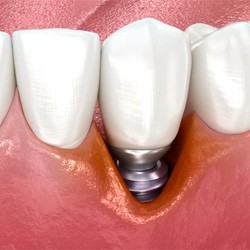Dental Implant Failure & Salvage – McKinney, TX
Saving Your Restored Smile
 Dental implants
boast an astonishing success rate of over 95%. However, that does still leave the slight possibility that something could go wrong. Rarely, dental implants fail. If you ever believe that is happening to you, our team is ready to help. We will examine your mouth, consider your treatment options, and do everything we can to save your restored smile. We want you to get back to enjoying a strong and healthy mouth as soon as possible!
Dental implants
boast an astonishing success rate of over 95%. However, that does still leave the slight possibility that something could go wrong. Rarely, dental implants fail. If you ever believe that is happening to you, our team is ready to help. We will examine your mouth, consider your treatment options, and do everything we can to save your restored smile. We want you to get back to enjoying a strong and healthy mouth as soon as possible!

Why Do Dental Implants Fail?
The most common reason for dental implant failure is an infection known as peri-implantitis. This condition occurs when bacteria attack the gums and bone around an implant, destroying its base of support. Often, poor oral hygiene is to blame for peri-implantitis, but other factors can also play a role in its development.
Other possible causes of dental implant failure include:
- Underlying medical conditions, such as some types of cancer
- Failed osseointegration (the implant never bonds properly with the surrounding bone)
- Physical trauma, such as what may be caused by an accident or chronic teeth grinding
Symptoms of a Failed Dental Implant

Dental implant failure can occur at any time, even years or decades after the initial surgery. That is why you should always be on the lookout for signs that something is amiss.
Here are some indications that you should seek professional care right away:
- Severe or unusual pain. After you adapt to your implants, you should have a pain-free smile. Pain after you have healed, or severe pain during your recovery, is a red flag.
- Difficulty chewing. It should be easy for you to eat almost any food with your dental implants. Struggles in this area may mean that something is seriously wrong.
- Signs of infection. Pus, swelling, gum recession, and redness are all possible indications of an infection.
- An implant feels loose. This could mean that something is wrong with the crown, bridge, or denture on top of your implant. It could also mean that the implant itself has a problem.
How Dental Implant Salvage Works

Book an appointment with us as soon as you believe that something is amiss with your implants. The earlier you receive care, the more likely it is that the problem can be solved with conservative or noninvasive methods.
When you arrive for your appointment, we will examine your mouth, take some X-rays, and ask about your symptoms. From there, we will be able to recommend your next steps. You might need something as simple as a course of antibiotics. Of course, there is also a chance that we will have to remove a failing implant and replace it after your mouth has had a chance to recover.

